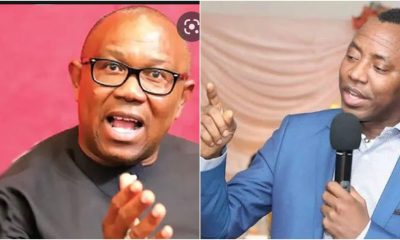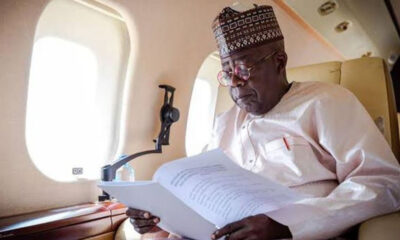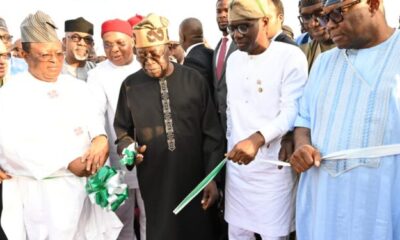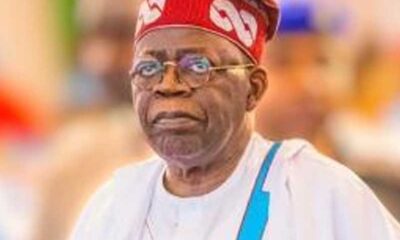News
Tinubu lists solutions to farmer-herder crisis, seeks national stakeholders meeting

National Leader of All Progressives Congress, Bola Tinubu, has finally spoken out on the farmer-herder crisis, which has resulted in bloody clashes in different parts of the country.
Tinubu, a former governor of Lagos, in a statement on Saturday, urged the Federal Government to convene a national security meeting comprising all stakeholders to resolve the crisis.
Even as he made a case for compensation for law-abiding farmers and herders who had been victims of the clashes, he said, “to help the herder and leave the farmer unattended is unfair and will only trigger a resentment that tracks already heated ethnic fault lines.”
Allegations that herders are responsible for killings and abductions in the South-West have generated tension in recent weeks.
For instance, Governor of Rotimi Akeredolu of Ondo State in January ordered herders to leave the state’s forest reserves. A youth leader, Sunday Igboho had also asked herders to vacate Ibarapa Local Government Area of Oyo State, accusing them of being behind many bloody attacks in the area.
President Muhammadu Buhari ordered security operatives to “go harder” on criminals and shoot anyone who possesses an AK-47 rifle illegally.
Tinubu said, “I recommend the Federal Government (should) convene a meeting of state governors, senior security officials, herder and farmer representatives, along with traditional rulers and religious leaders. The purpose of this meeting would be to hammer out a set of working principles to resolve the crisis.
“After this meeting, governors of each state should convene follow-up meetings in their states to refine and add flesh to the universal principles by adjusting them to the particular circumstances of their states.”
He stressed that farmers and herders should be supported by improving their method of operations.
He said law enforcement agents were also required in rural communities, adding that both federal and state governments “need to employ new technology and equipment to enhance the information gathering/surveillance and response capabilities of law enforcement”.
In addition, Tinubu said, “Both innocent and law-abiding farmer and herder need to be recompensed for the losses they have suffered. Both need further assistance to break the current cycle of violence and poverty.”
He urged all Nigerians to be united, embrace peace through dialogue and violence.
Tinubu’s full statement
The herder-farmer dispute has taken on acute and violent dimensions. It has cost too many innocent lives while destroying the property and livelihoods of many others. It has also aggravated ethnic sentiment and political tension. Despite the efforts of some of those in positions of high responsibility and public trust, the crisis has not significantly abated. Sadly, others who should know better have incited matters by tossing about hate-tainted statements that fall dangerously short of the leadership these people claim to provide. We all must get hold of our better selves to treat this matter with the sobriety it requires.
Because of the violence that has ensued and the fretful consequences of such violence if left unabated, we must move in unison but decisively to end the spiral of death and destruction. Only when the violence and the illogic of it are halted can logic and reason prevail. Until the violence is rolled back, we cannot resolve the deep problems that underlie this conflict. We will neither be able to uplift the farmer from his impoverished toil nor move the herder toward the historic transformation which he must make.
Yet, as vital as security is to the resolution of this matter, we must realize security measures alone will not suffice. Enhanced security may be the necessary first step, but it cannot be the only step. Nor do we resolve this by hitching ourselves to emotional, one-dimensional answers. More to the point, those who cast this as exclusively a matter of ethnic confrontation are mistaken. This is no time for reckless chauvinism of any kind, on either side of this dispute. This matter is not ethnic in factual origin or actual causation although in the minds and hearts of too many it has become ethnic in recrimination and impulsive action.
There have been sporadic disputes in the past but this one is more severe. The reasons for the greater violence of this current dispute are myriad. Economic hardship and its resultant dislocation, proliferation of weapons, generalized increase in criminality, and weakening of social institutions all play a role. Desertification, increased severity and length of the dry season, diminution of water resources, impairment of land fertility and population growth also contribute in no small measure. Thus, any durable solution must get at most, if not all, of these issues.
Farmers have a right to farm their land unmolested. Herders have a right to raise their livestock without undue interference. However, when conflict between these groups arises to such an extent, we must set forth clear principles and policies to remove the tension, in order to allow both to proceed toward their stated goals and to live in harmony and according to their respective rights. Just as I cannot go into your house and take your shirt because I do not have one of like colour, no one can destroy the crops of a farmer or seize the cattle of a herder simply because such destruction sates their anger or their selfish, short-term interests. If such a condition were to hold, then all would turn into chaos; all would be in jeopardy of being lost. To destroy the crops or seize the property of the innocent farmer or herder is nothing if not an act of criminality.
Here, I must state two fundamental realities. One has been previously mentioned by me and others as part of the solution. The other reality is hardly discussed.
First, the situation of the herder is becoming untenable. Their nomadic ways fall increasingly in conflict with the dictates of modern society. This way of life is centuries old and steeped in tradition. We can never condone or accept violence as a valid response to any hardship. However, we all must recognize and understand the sense of dislocation caused by the sudden passing of such a longstanding social institution.
I mention their dislocation not to excuse violence and other excesses. I raise it to underscore that we must realize the true complexity of this crisis. What is happening has been terrible, but it is not due to any intrinsic evil in either the herder or the farmer. The calamity now being faced is borne of situational exigencies. It is but the tragic outcome when often desperate, alienated people are left too long unattended and when their understanding of the modern socio-economic and environmental forces affecting the very terms of their existence is incomplete. An ethnically fuelled response will be to vociferously defend the nomadic way believing this tack will somehow protect the herder and cast the speaker as an ethnic champion. However, careless words cannot shield the herder from relentless reality. Such talk will only delude him into believing that he can somehow escape the inevitable. We do both herder and farmer grave injustice by allowing the herder to continue as he is – fighting a losing battle against modernity and climate change. In that fight, desperation causes him to flail and fight the farmer, who too is a victim of these impersonal forces.
Second, to help the herder and leave the farmer unattended is unfair and will only trigger a resentment that tracks already heated ethnic fault lines. The times have also been perilous for the hardscrabble farmer. He needs help to survive and to be more productive in ways that increases national food security. Farm productivity and incomes must be enhanced. Soil enrichment, better irrigation and water retention as well as provision of better rural roads, equipment and access to modern machinery are required to lift him above bare subsistence.
Both innocent and law-abiding farmer and herder need to be recompensed for the losses they have suffered. Both need further assistance to break the current cycle of violence and poverty. In short, the continued progressive reform of many of our rural socio-economic relationships is called for.
Based on these strategic observations, I recommend the federal government convene a meeting of state governors, senior security officials, herder and farmer representatives, along with traditional rulers and religious leaders. The purpose of this meeting would be to hammer out a set of working principles to resolve the crisis.
After this meeting, governors of each state should convene follow-up meetings in their states to refine and add flesh to the universal principles by adjusting them to the particular circumstances of their states. In addition to religious and traditional leaders and local farmer and herder representatives, these meetings shall include the state’s best security minds along with experts in agriculture (livestock and farming), land use and water management to draw specific plans for their states.
To accomplish this goal, wise policy must include the following elements:
- Maintain reasonable and effective law enforcement presence in affected areas. The proposed reform of the Nigerian law enforcement apparatus towards state and community policing can help in this regard. The legislative and administrative measures required to make this a reality should be expedited. In addition to alleviating the present farmer-herder crisis, this reform will also bolster efforts against the banditry, kidnapping and robbery plaguing communities across the country. Governments need to employ new technology and equipment to enhance the information gathering/surveillance and response capabilities of law enforcement.
- Help the herders’ transition to more sedentary but more profitable methods of cattle-rearing. Unoccupied public land can be fenced into grazing areas or ranches and leased to herders on a very low-cost, nominal basis. The leasing is not intended to penalize herders. Rather, the nominal fee is intended to ensure the herders are invested in the project and incentivized (by reason of their investment) to use the land provided. This aspect will also mitigate any resentment over herders being given land for free. Government, in turn, being a responsible lessor, must help with supplemental feed and water in these areas. This will enable herders to better maintain and care for their livestock thus enhancing their incomes. Herders can augment income by becoming suppliers to the leather goods industry. Additionally, herders can also develop a more symbiotic relationship with farmers by, for example, trading animal compost to the farmer in exchange for animal feed.
- Assist farmers increase productivity by supporting or providing subvention for their acquisition of fertilizer, equipment and machinery and, also, by establishing commodity boards to guarantee minimum prices for important crops. In the medium to long term, resources must be dedicated to establishing better irrigation and water catchment systems to further improve farm productivity and mitigate the dire impact of flood and drought cycles brought about by extreme climatic conditions.
- Establish a permanent panel in each state as a forum for farmers, herders, security officials and senior state officials to discuss their concerns, mitigate contention and identify trouble and douse it before it erupts.
We are a populous nation of diverse ethnic groups. We are a people of potential richness, yet to escape present poverty. We have resources but not wealth. Often, our words speak of hope and fear in the same breath. While we all hope and strive for the best, many fear that there is not enough of what is needed to go around and that they will be left out. In such a situation, harsh competition and contest are fated to occur. In the unfolding of this social dynamic, one group of actors has been pitted against another over dwindling water and fertile ground. The confrontation has resulted in the needless loss of life and destruction of property. If left to itself, this situation may spread and threaten the progress of the nation. It could call into proximate question the utility of the social compact that holds government and governed in positive bond, one to the other. We have a decision to make. Do we attempt the hard things that decency requires of us to right the situation? Or do we allow ourselves to be slave to short term motives that appeal to base instinct that run afoul of the democratic principles upon which this republic is founded and for which so many have already sacrificed so much? In the question itself, lies the answer.
SIGNED
Asiwaju Bola Tinubu.
March 13, 2021.
News
FG announces plans to borrow N13.8tn for 2025 budget

FG announces plans to borrow N13.8tn for 2025 budget
ABUJA—THE Federal Executive Council (FEC) yesterday approved a budget proposal of N47.9 trillion for the 2025 fiscal year and borrowing of N13.8 trillion.
The Minister of Budget and Economic Planning, Atiku Bagudu, disclosed this while briefing State House correspondents, at the end of the Council meeting, presided over by President Bola Tinubu at the Presidential Villa, Abuja.
The approval is part of the Medium Term Expenditure Framework, MTEF, and Fiscal Strategy Paper, for 2025-2027, by the Fiscal Responsibility Act of 2007.
The framework is expected to be submitted to the National Assembly as required by law, either on Friday or Monday.
Bagudu outlined several key parameters that will guide the 2025 budget based on economic projections and government priorities. These include a projected Gross Domestic Product (GDP) growth rate of 4.6% for 2025, an oil price benchmark of $75 per barrel and an exchange rate of N1.400 to $1.
Additionally, the government anticipates oil production at 2.06 million barrels per day.
In terms of fiscal strategy, the budget assumes that the government will borrow approximately N13.8 trillion — about 3.87% of the GDP — to fund key infrastructure projects and economic initiatives.
Bagudu emphasized that this borrowing is part of a strategic plan to balance government spending with sustainable debt management.
The Minister further noted that “the Nigerian economy is showing signs of resilience, with a 3.19% growth rate recorded in the second quarter of 2024.
READ ALSO:
- We didn’t arrest Hamdiyya Sidi for criticising Sokoto governor – Police
- Four varsity lecturers dismissed for sexual misconduct
- Super Eagles seal AFCON 2025 spot, draw 1-1 against Benin
This growth is expected to continue through 2025, driven by efforts to tackle inflation and stabilize key economic sectors.”
Bagudu lists the aims of fiscal policies
He stressed that the Federal Government’s fiscal policies are aimed at strengthening economic resilience, continuing to address inflationary pressures, and providing more targeted support to drive long-term growth.
Bagudu also highlighted that the implementation of the 2024 budget was progressing well, with significant improvements in revenue collection and expenditure management, despite some delays in achieving pro-rated targets.
“Non-oil revenue streams, in particular, have performed better than initially expected, showing promising progress.
The N47.9 trillion proposed budget for 2025 includes various provisions, particularly in areas such as infrastructure development, social programs, and critical national projects.
Bagudu also revealed that for the first time, the government’s budget will include contributions to the development commissions that had recently been passed or were in the process of being passed by the National Assembly.
“These measures are designed to strengthen the country’s social and economic development at the grassroots level.”
He further noted that the federal government is committed to ensuring that the 2025 budget is passed and signed into law before December 2024, in order to create a predictable fiscal environment and adhere to the January-December budget circle that the administration aims to implement moving forward.
In addition to approving the 2025 budget, the FEC also endorsed the 2025-2027 Medium Term Expenditure Framework, MTEF, and Fiscal Strategy Papers, FSP, which outline the government’s long-term fiscal policies and strategies for achieving sustainable growth.
These documents will now be sent to the National Assembly for further review.
Bagudu emphasized that the MTEF and FSP provided the necessary roadmap for the government’s fiscal policy over the next three years, ensuring that public finances remained on a sound footing and that economic growth targets were met.
He expressed confidence that Nigeria’s economic trajectory was moving in the right direction, with positive growth recorded in key sectors.
He stressed that the government’s macroeconomic policies, particularly in the areas of market-driven pricing for petroleum products and foreign exchange, are contributing to the country’s overall economic stability.
“The fiscal efforts are on track, and we are confident that with these strategic investments and reforms, Nigeria will continue to make progress toward a more resilient and sustainable economy,” he declared.
Experts fault govt’s budget assumptions
Economy experts who spoke to Vanguard, however, faulted the budget assumptions, describing some of them as too aggressive.
In his comment, David Adonri, Analyst and Executive Vice Chairman at Highcap Securities Limited said : “One thing that bothers me is the failure of FGN to attach a report of the performance of the previous budget while seeking for approval of the new budget.
“Historical antecedents will let us know whether the assumptions underlying the new budget are reasonable.
“How will FGN finance the budget? Is it still a deficit budget like on previous occasions? There is nothing on ground to indicate that GDP growth rate of 4.6% is attainable in 2025.
“The omission of the forecast for inflation is questionable because the intended GDP growth may just be an inflationary growth which is akin to motion without movement.
“With Donald Trump’s agenda to release more fossil fuel from 2025, the crude oil price forecast may be misleading.
‘Finally, predicating the budget on a crude oil-driven economy shows that budgeting by FGN has not departed from past ruinous economic philosophy.
“It is too pedestrian for a country that should be inward-looking and focused on the mobilization of the idle factors of production in the country.”
On his part, Tunde Abidoye, Head of Equity Research FBNQest Securities Limited, said: “I think that some of the assumptions are a bit aggressive.
“The oil production benchmark of 2.06mbpd looks very ambitious given the current realized oil production level of around 1.3mbpd (ex-condensates), per NUPRC data.
“The exchange rate and GDP growth rate projections are also a bit optimistic given the current exchange rate is N1,650, and the strain on household wallets.
“However, although I think the oil price benchmark is realistic, there are potential downside risks arising from the anticipated ramp up of oil production by the US following President Trump’s victory at the polls.”
Also commenting, Clifford Egbomeade, Public Affairs Analyst/ Communications Expert, said: “The proposed 2025 budget of N47.9 trillion, based on a $75 oil benchmark, 2.06 mbd production, and 4.6% GDP growth, sets ambitious targets given Nigeria’s economic climate.
“The oil production target assumes steady output levels, which may be impacted by infrastructure limitations. Moreso, the projected 4.6% GDP growth may be optimistic, as Nigeria continues to face high inflation, currency pressures, and unemployment.
“The budget includes N9.22 trillion in new borrowing, raising concerns about fiscal sustainability given the nation’s current debt servicing load. “The assumed exchange rate of N1,400 per dollar suggests continued devaluation, which could intensify inflationary pressures. Achieving this budget will require effective fiscal reforms and greater economic diversification to meet revenue and growth targets.”
Dissecting the proposed budget, Port Harcourt-based energy analyst, Dr. Bala Zakka, said: “Oil market is very volatile and absolute caution should be taken in the process of taking the benchmark price for the 2025 budget.”
On output, he said: “The federal government said it is currently producing 1.8 million barrels per day, including condensate. Like in the case of price, adequate caution should also be taken here. I strongly believe that stakeholders, including the government and investors should work harder to further increase the nation’s capacity to produce oil and gas.”
“The Gross Domestic Product, GDP, is all about the production of goods and services in an economy. With constant power supply disruptions, it has not been possible for households and businesses to participate in the economy. It is very doubtful if they will be able to increase investment to produce goods and services in 2025.”
FG announces plans to borrow N13.8tn for 2025 budget
News
Edo Gov Okpebholo freezes govt accounts, reverses ministry’s name

Edo Gov Okpebholo freezes govt accounts, reverses ministry’s name
Edo State Governor, Monday Okpebholo, has directed the immediate freezing of all state-owned bank accounts.
In a statement issued on Thursday by his Chief Press Secretary, Fred Itua, the governor stated that the accounts would remain frozen until further notice.
He instructed commercial banks, ministries, departments, and agencies (MDAs) to comply with the order immediately or face severe consequences.
The statement reads: “All state bank accounts with commercial banks have been frozen. Commercial banks must comply with this order and ensure that not a single naira is withdrawn from government coffers until further notice.
READ ALSO:
- Wike claims Adeyanju became activist after he rejected request to be PDP Publicity Secretary
- VeryDarkMan to Falana: I won’t apologise to anybody
- Court adjourns Falana’s suit against VeryDarkMan to January 2025
“Heads of Ministries, Departments, and Agencies must ensure full compliance without delay.
“Following necessary investigations and reconciliations, the governor will take appropriate action and decide on the way forward. For now, this order remains in effect.”
Okpebholo also directed relevant agencies to revert the name of the Ministry of Roads and Bridges to its previous title, the Ministry of Works, a change made during the Godwin Obaseki administration.
“It is odd to name a government institution the Ministry of Roads and Bridges, especially when not a single bridge was built by the previous administration — not even a pedestrian bridge.
“In the coming days, we will examine further actions taken by the previous administration and make decisions that serve the best interests of the state,” the statement added.
Edo Gov Okpebholo freezes govt accounts, reverses ministry’s name
News
Israel-Palestinian conflict: Two-state solution is a deception, says Gumi

Israel-Palestinian conflict: Two-state solution is a deception, says Gumi
Prominent Islamic scholar Dr. Ahmad Mahmud Gumi has criticized the widely discussed two-state solution for the Israel-Palestine conflict, calling it a “deception.”
His remarks followed a recent summit of the Organisation of Islamic Cooperation (OIC) in Riyadh, where President Bola Tinubu and other leaders condemned Israel’s actions in Gaza and urged an end to hostilities.
In an interview with Daily Trust at his Kaduna residence, Gumi argued, “This Two-State Solution is a deception. No Israeli will allow a Palestinian to survive, and Palestinians will never allow Israel to survive.
READ ALSO:
- Court sacks Ondo LP candidate, two days to governorship poll
- FBI raids home of crypto platform Polymarket CEO, after accurate prediction of Trump win
- 24-hour power supply: FG seeks private sector support for $10bn funding gap
The only solution is to dissolve the two states and create a democratically electable region.”
Gumi commended the OIC’s support for Palestine, noting that Muslims and Arabs worldwide increasingly see the treatment of Palestinians as “genocide” and accuse Israel of human rights abuses.
He also called for a return to the pre-1948 structure, where Palestinians, Jews, and Christians lived together, suggesting a single, inclusive state that allows peaceful coexistence.
“When I hear people talking about Two-State Solutions, I know they are just deceiving themselves,” Gumi added, advocating for a unified region where people of all faiths can live together, similar to the multi-faith coexistence seen in countries like the United States.
Israel-Palestinian conflict: Two-state solution is a deception, says Gumi
-

 Sports15 hours ago
Sports15 hours agoBREAKING: Super Eagles qualify for AFCON 2025
-

 Railway3 days ago
Railway3 days agoNigerian railway adds extra train to Friday, Saturday trips on Lagos-Ibadan route
-

 Aviation16 hours ago
Aviation16 hours agoDisaster averted as bird strike hits Abuja-Lagos Air Peace flight
-

 International3 days ago
International3 days agoUK announces 45,000 seasonal worker visas for 2025
-

 Education2 days ago
Education2 days ago12-year-old Nigerian girl Eniola Shokunbi invents air filter to reduce spread of diseases in US schools
-

 Business3 days ago
Business3 days agoTop 5 crypto apps that work with Nigerian Bank accounts
-

 Politics2 days ago
Politics2 days agoWhy I can’t form coalition with Peter Obi – Sowore
-

 News18 hours ago
News18 hours agoEdo Gov Okpebholo freezes govt accounts, reverses ministry’s name














